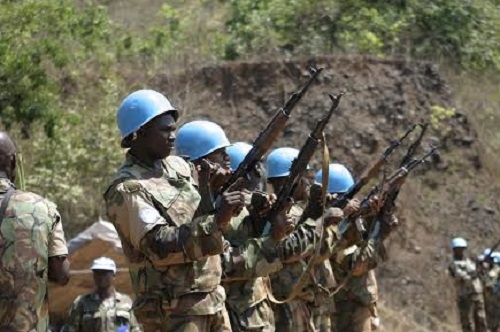UNMIL drawdown to cost Liberia $50m
Liberia’s Finance Minister Amara Konneh last week revealed that it would cost the government of Liberia US$50 million to fill in all necessary gaps when UNMIL drawdown is completed.
“While our service sector has been another driving force of economic growth, it is expected to take a hit as the United Nations Mission in Liberia(UNMIL)draws down its presence in the country, and as NGO activities reaches arguably lower levels” Minister Konneh announced at Tuesday’s special press briefing at the Ministry of Information Culture and Tourism.
He underscored a slowdown in domestic services such as food, entertainment, domestic support as direct effect of the troops’ drawdown, saying, “This will, of course, have a corresponding impact on employment and secondary effect on economy activity.
“A mitigating factor is, once again, the increase in exports in the mining sector, which the Government has worked hard to ensure by removing infrastructure and bureaucratic bottlenecks that hindered our concessionaires from rolling out their operations and begin producing and exporting to set timelines,” Minister Konneh suggested.
Commenting on the status of the economy, he disclosed the country’s Gross Domestic Product (GDP) is currently experiencing a slightly lower growth rate from 8.3% in 2013 to 8.1 in 2014.
“Liberia’s real Gross Domestic Product (GDP) growth so far this fiscal year is estimated at 8. percent, which is just slightly lower than the 8.3 percent growth recorded in 2012,” Finance Konneh said.
He said the growth in 2013 was largely driven by increased in mining activities, especially iron-ore exportation by China Union and Arcelor Mittal, a situation he said is expected to continue until the medium-term.
Minister Konneh also projected a major boost in tax revenue collection by approximately US$400 million per annum.
“We expect to increase in employment of Liberians by approximately 80,000-90,000 jobs in the next 5-10 years,” Minister Konneh revealed.
Despite the measures being put in place, Minister Konneh however admitted that a lot more work needed to be done in order to get the economy at a middle income level by 2030.
Already, he disclosed: “The approved budget for this fiscal year amounted to US$582.9 million and was revised downward to US$560.3 million, based on assessed revenue risk. I should say here that when the term ‘revenue shortfall’ is used it means that we expected to generate a particular amount, and did not.
“We sense that, in some quarters, the term is being misunderstood as being an overall reduction in the revenue generation, as compared to previous years, which is not the case..”
In actual sense, he said, the government has increased its revenue intake over the last four years. In fiscal year 2010/2011, he disclosed, US$438.9 as the total revenue collected and that US$477.2 million was also collected for the fiscal year 2011/2012.
“In fiscal year 2012/2013, the total revenue collected was US$559million. Today, once again, we project US$560.3 million come June 30th. And based on that number, we have already collected $US344.5 million,” he said, noting that the government is on track for achieving its economic goal.
Text & Photo: Peter N. Toby


